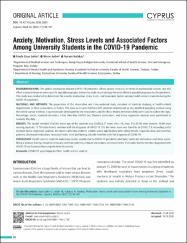| dc.contributor.author | Uzun Şahin, Ceyda | |
| dc.contributor.author | Aydın, Merve | |
| dc.contributor.author | Kulakaç, Nurşen | |
| dc.date.accessioned | 2023-03-10T06:42:09Z | |
| dc.date.available | 2023-03-10T06:42:09Z | |
| dc.date.issued | 2022 | en_US |
| dc.identifier.citation | Uzun Şahin, C., Aydın, M. & Kulakaç, N. (2022). Anxiety, Motivation, Stress Levels and Associated Factors Among University Students in the COVID-19 Pandemic. Cyprus Journal of Medical Sciences, 7(1), 94-101. http://doi.org/10.4274/cjms.2020.2685 | en_US |
| dc.identifier.issn | 2149-7893 | |
| dc.identifier.issn | 2536-507X | |
| dc.identifier.uri | http://doi.org/10.4274/cjms.2020.2685 | |
| dc.identifier.uri | https://hdl.handle.net/11436/7854 | |
| dc.description.abstract | BACKGROUND/AIMS: The global coronavirus disease (COVID-19) pandemic affects society seriously in terms of psychosocial aspects, but this
effect is more intense on some specific population groups. University students are among the most affected population groups by the pandemic.
This study was conducted to determine the anxiety, motivation, stress levels, and associated factors among health science students during the
COVID-19 pandemic.
MATERIALS AND METHODS: The population of this descriptive and cross-sectional study consisted of students studying at health-related
departments in three universities in Turkey. The data were collected from 855 students determined by the stratified sampling method using
the online survey method. A questionnaire developed by the researchers and the Beck Anxiety Inventory (BAI) were used to collect the data.
Percentage, mean, standard deviation, t-test, One-Way ANOVA test, Pearson correlation, and linear regression analysis were performed to
evaluate the data.
RESULTS: The results revealed that the mean age of the students was 20.85±2.37 years (min: 18; max: 41), 80.5% were women, 38.0% were
nursing students, 13.7% had a family member with the diagnosis of COVID-19. The BAI mean score was found to be 29.00±7.8. According to the
multiple linear regression analysis, the factors affecting students’ anxiety scores significantly were being female, impaired sleep and nutrition
patterns, decreased motivation, increased stress level and having a family member with the diagnosis of COVID-19.
CONCLUSION: Health science students experience severe anxiety due to COVID-19 pandemic and have moderate motivation and stress scores.
Being a woman, having impaired sleep and nutrition patterns, reduced motivation, increased stress level and a family member diagnosed with
COVID-19 are factors influencing the level of anxiety. | en_US |
| dc.language.iso | eng | en_US |
| dc.rights | info:eu-repo/semantics/openAccess | en_US |
| dc.subject | COVID-19 | en_US |
| dc.subject | Psychological effect | en_US |
| dc.subject | Health science student | en_US |
| dc.title | Anxiety, motivation, stress levels and associated factors among university students in the COVID-19 pandemic | en_US |
| dc.type | article | en_US |
| dc.contributor.department | RTEÜ, Sağlık Hizmetleri Meslek Yüksekokulu, Tıbbi Hizmetler ve Teknikler Bölümü | en_US |
| dc.contributor.institutionauthor | Uzun Şahin, Ceyda | |
| dc.identifier.doi | 10.4274/cjms.2020.2685 | en_US |
| dc.identifier.volume | 7 | en_US |
| dc.identifier.issue | 1 | en_US |
| dc.identifier.startpage | 94 | en_US |
| dc.identifier.endpage | 101 | en_US |
| dc.relation.journal | Cyprus Journal of Medical Sciences | en_US |
| dc.relation.publicationcategory | Makale - Uluslararası Hakemli Dergi - Kurum Öğretim Elemanı | en_US |


















